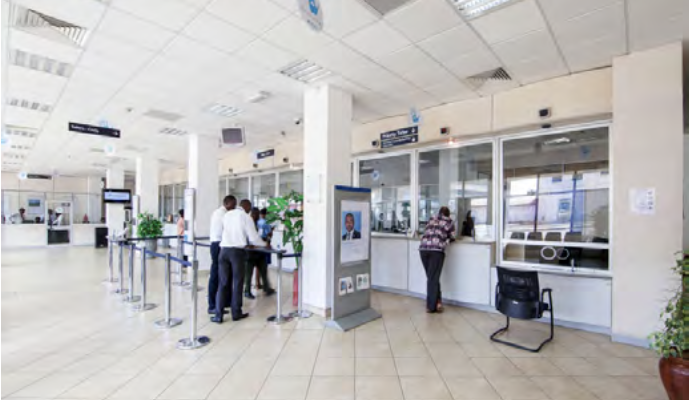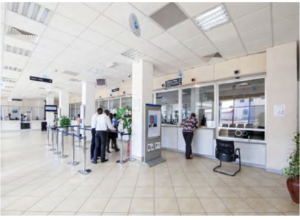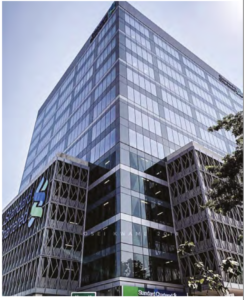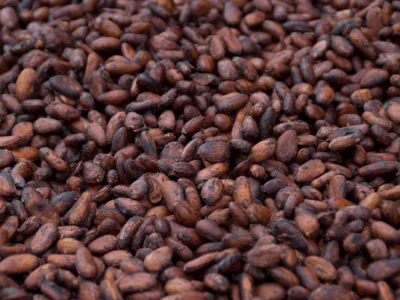The financial services sector in Ghana encompasses
a diverse range of institutions, including domestic and international banks, insurance providers, asset managers, and a stock exchange. Despite the challenges posed by the Covid-19 pandemic in 2020, the industry has displayed resilience, with various subsectors experiencing growth.
Ghana’s financial landscape comprises 23 banks, overseen by the regulatory authority, the Bank of Ghana (BoG). These banks play a crucial role in pro- viding a wide array of financial services to individuals, businesses, and the gov- ernment.
The sector also includes 25 savings and loans institutions, 11 finance houses, and three finance and leasing houses, which contribute to the overall financial ecosystem by offering specialised ser- vices. The Ghana Stock Exchange serves as a platform for trading securities, with 30 companies listed on the main ex- change and six companies listed on the Alternative Market. The Securities and Exchange Commission regulates the capital market activities in Ghana.
Recent developments in the sector point to efforts by the regulator to strengthen it, as well as investor confidence in the Ghanaian economy. The Bank of Ghana and Giesecke+Devrient (G+D) are test- ing the e-Cedi, a digital currency, to facilitate cashless transactions among businesses and individuals. This initia- tive aligns with the government’s cash lite agenda, promoting digital payments while ensuring a secure payment infra- structure. In 2021, the European Invest- ment Bank collaborated with Ghana’s Ministry of Finance to provide a €170 million facility for establishing the De- velopment Bank Ghana (DBG). DBG aims to support the private sector, fos- tering expansion and job creation, thus contributing to economic growth.
The BoG implemented a new liquidity assistance framework in February 2021 to address weaknesses identified during the banking sector crisis. This framework enhances liquidity planning for banks, savings & loans companies, and finance houses while safeguarding BoG’s balance sheet against settlement failures. In August 2021, LeapFrog Investments acquired a 16.94 percent stake in Fidelity Bank Ghana Limited from Amethis and Edmond de Roth- schild Equity Strategies (ERES). This investment underscores confidence in Ghana’s financial sector and highlights opportunities for growth and expan- sion.
Insurance providers operate under the oversight of the National Insurance Commission, offering various insur- ance products to individuals and busi- nesses to mitigate risks and protect as- sets. The National Pensions Regulatory Authority regulates the pensions indus- try, ensuring compliance with pension regulations and safeguarding the inter- ests of pension scheme participants.
The Ghanaian insurance sector has witnessed substantial growth over the years. Non-life insurance contributes 47 percent of total premiums, while life insurance contributes 53 percent. This highlights a balanced contribution from both segments to the overall premium base. Despite growth, insurance pen- etration stands at a little over 1 percent. However, when considering health in- surance and pensions, the penetration rate is estimated to be 3 percent, indicat- ing room for improvement.
The top four companies in the life seg- ment dominate, accounting for about 75 percent of all life insurance premiums. Conversely, the market is fragmented below the top players, with smaller in- surers holding less than 8 percent mar- ket share, suggesting potential for con- solidation, possibly driven by foreign entrants. Efforts are underway to pro- mote microinsurance to deepen insur- ance penetration, targeting underserved segments of the population. Technological advancements, particularly in direct digital sales and services, are aiding in increasing insurance penetration, mak- ing insurance more accessible to a wider audience.
The Ghanaian financial market boasts a market capitalisation of GHS 64.5 billion, reflecting the size and scope of investment opportunities available. The Ghana Stock Exchange provides an avenue for investment and access to capital, listing various securities such as shares, corporate bonds, municipal bonds, government bonds, and unit trusts. Companies listed include lead- ing domestic banks, mining, and food and drink companies. The Ghana Fixed Income Market facilitates secondary trading of fixed income securities and other securities, contributing to market liquidity and investment opportunities.
In 2021, the GSE launched a three year strategic plan aimed at transforming the capital market sector from a frontier market to an emerging market. Initia- tives include introducing new products like derivatives and green bonds to enhance liquidity and attract investors. The Securities and Exchange Com- mission employs a balanced approach to regulate the market, supporting in- novation while safeguarding investor interests, market integrity, and financial stability.
Pension schemes in Ghana aim to pro- vide retirement benefits to contributors and beneficiaries. These schemes are or- ganised around a three tiered structure that includes the Basic National Social Security Scheme, a mandatory, fully funded occupational pension scheme, a voluntary provident fund, and personal pension plans. The first, mandatory tier is administered by the state-owned Social Security and National Insurance Trust, the biggest player in the pensions sector.
Recent developments include the launch of the Injaro Ghana Venture Capital Fund to diversify pension port- folios and a strategic plan by NPRA to increase pension coverage to 40 percent by 2026, aiming to reduce old-age pov- erty and boost the sector’s contribution to the economy. Additionally, partner- ships like the one between Ecobank Ghana and Enterprise Trustees seek to enhance pension benefits, such as through pension-backed mortgages.
• Partnering with insurance com- panies to expand their market reach through Bancassurance.
• Partnering with the One District One Factory Initiative to provide sub- sidised loans to emerging companies, boosting their loan book balance and interest income.
• Opportunities exist in developing technological infrastructure for online banking, enhancing convenience and accessibility for customers.
• Establishing banking institutions like savings and loans companies to tar- get the unbanked population, providing financial services to those who cannot access traditional banking systems.
• Introduction of InsurTech solu- tions to offer policies and claims filing through mobile devices, eliminating the need for physical branches.
• Marketing microinsurance policies to low-income individuals who may not have access to traditional insurance services.
• As lending rates decrease, the de- mand for mortgage facilities increases, providing opportunities for financial institutions to offer insurance products for these properties.
• The GSE plans to introduce green market products and derivatives, pro- viding more investing opportunities for pension funds and allowing them to diversify their asset base.
• There are opportunities to establish institutions and mutual funds to lever- age global securities, potentially attract- ing the unbanked population through education about investing.
• Opportunities exist to invest in fin- tech solutions that improve cybersecu- rity within the capital markets, ensuring the safety of transactions and data.
• With Ghana’s relatively high literacy rate of 69.8 percent, there are opportuni- ties to encourage the population to enrol in voluntary pension schemes, fostering a savings culture among citizens.
• The NPRA’s decision to allow pri- vate equity fund managers access to a portion of the GHS 22 billion managed by private pension schemes creates op- portunities for foreign investors to par- ticipate in such funds.
• NPRA aims to introduce special legislation for the informal sector, le- veraging mobile money platforms to promote pension coverage and offering incentives to members who choose this method for retirement planning.
INVESTMENT INCENTIVES
• Ghana’s youthful population of 30.8 million, expected to grow at a CAGR of 2 percent in the next 10 years, offers significant potential for economic trans- formation and growth, particularly in the financial sector.
• Initiatives across the financial indus- try aim to capture the unbanked popu- lation, evident in the substantial growth of mobile money transactions from GHS 32.8 billion as of December 2019 to GHS 162 billion by year end 2023.

• The National Pensions Regulatory Authority has permitted pension funds to invest in private equity, aiming to diversify Ghanaian pension fund as- sets and provide a capital boost for the economy.
• Various subsectors within the finan- cial industry are developing technologi- cal infrastructure, such as online bank- ing applications, enabling customers to conduct financial transactions seamless- ly through online platforms, enhancing convenience and accessibility.
• Aligned with the SEC’s strategic plan, the Ghana Stock Exchange will introduce securities focusing on sustain- ability and green practices. This initiative provides investors with more options for investment securities, tapping into the global trend towards green business practices.
Bank credit to the private sector contracted in real terms as the economy slowed down, inflation rose sharply, and banks shifted their portfolios away from government securities. In 2022, real private sector credit contracted by 14.5 percent compared with a 1.3 percent contraction in 2021. In nominal terms, it increased by 31.8 percent in 2022, slower than overall inflation. Credit flow to the private sectorremained concentrated in five sectors – services, commerce and finance, electricity, water and gas, manufacturing, and construction. In 2023, real private sector credit continued to contract year on year, including by 15.2 percent in April. In 2022, interest rates in the money market went up across the yield curve, in line with the increases in the policy rate. At end December 2022, the 91-day T-bill rates rose to 35.5 percent from 12.5 percent a year before (while 182-day and 364-day T-bill rates experienced similar increases). On the secondary market, yields on all bonds, from two-year through to 20-year, almost doubled over the one-year period. The interbank weighted average rate increased to 25.5 percent in December 2022, from 12.7 percent in December 2021, consistent with the increases in the policy rate and the incremental hikes in the primary reserve requirements from 12 percent in August 2022 to 14 percent in October. As a result, the average lending rates of banks rose to 35.6 percent in December 2022 from 20 percent in at the end of 2021. Developments in the first four months of 2023 indicates that while T-bill rates reduced significantly due to high demand for the instruments, rates have increased in April.
Source: 7th Ghana Economic Update. Price Surge: Unravelling Inflation’s Toll on Poverty and Food Security. Pro- duced by the World Bank Group. https://documents1.worldbank.org/curated/en/099072023055014341/pdf/ P177994046644e0e20b3dd057c81347c0ef.pdf
















Comments